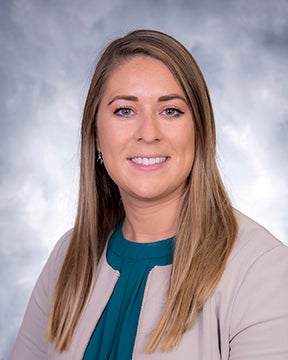Body
 One major lifestyle change that will help you achieve your weight loss and wellness goals after bariatric surgery is getting into a regular exercise routine. The key to a lasting exercise routine is to find exercise that you enjoy doing, which in turn will keep you showing up. Change your mind set on exercise, instead of viewing it as a punishment or only as a means of calorie burning/weight loss, and focus on all the health benefits that come along with exercising!
One major lifestyle change that will help you achieve your weight loss and wellness goals after bariatric surgery is getting into a regular exercise routine. The key to a lasting exercise routine is to find exercise that you enjoy doing, which in turn will keep you showing up. Change your mind set on exercise, instead of viewing it as a punishment or only as a means of calorie burning/weight loss, and focus on all the health benefits that come along with exercising!
Benefits of Exercise
- Improves quality and quantity of sleep
- Improves mood
- Slows aging
- Lowers risk for heart disease, type 2 diabetes, and many types of cancer
- Improves immune system function
- Improves memory and lowers risk of dementia
- Increases energy levels and stamina
- Helps lower blood sugar and blood pressure
- Relieves stress
- Strengthens your heart, muscles, and bones
- Improves circulation and joint flexibility
- Prevents injuries and falls
When Can I Begin Exercising After Surgery?
You will be encouraged to get out of the hospital bed as soon as you are feeling able and begin slowly walking around the unit halls to promote blood circulation, help prevent blood clots, and to expel any gas from the surgery. Once you discharge from the hospital, you can walk and go up and down stairs as tolerated. Low impact exercises like brisk walking is the preferred form of exercise initially. No heavy lifting anything over 25lbs for 4-6 weeks (or once your doctor clears you) and no swimming until incision sites are fully healed. Avoid doing any exercise that involves bending over or abdominal crunching until you are no longer experiencing pain from the surgery and incision sites are healed. Focus on your recovery first before beginning an exercise routine.
How Much Exercise Should I Do?
Aim for 30-45 minutes at least 3-4 times a week. Seem overwhelming at first? Start out slow and work your way up to that amount. Everyone has to start somewhere! Don’t have a full 30-40 minute block in your day? Exercise can be split up into smaller increments spread throughout the day and still be effective. See if you can fit in 3 ten minute bouts of exercise throughout your day. Maybe you park as far away from your work entrance as possible and take the stairs in your office instead of the elevator. Save the last 10 minutes of your lunch break to walk, do squats, calf raises, or balance exercises before going back to work. Take your dog for a 10 minute walk instead of letting it out in your back yard. Do some core exercises in between commercial breaks when watching TV in the evening. Have a 10 minute dance party with your kids to wind down after dinner! All of these things can add up to a full 30-45 minutes of exercise throughout the day.
What Kind of Exercise is Best?
Whatever kind of exercise you actually enjoy doing is what you will stick with! The good news is there are tons of different ways to be physically active, so trying different things to find what you like is key. Get out of your comfort zone and give yoga, Zumba, pickleball, spinning, hiking, biking, or country line dancing a try! You never know what you might like if you never try it. Many people find typical weight lifting gyms to be intimidating because they don’t know how to use the equipment or what to do, or they fear getting hurt. If you have specific mobility limitations like back, knee, or other joint issues, then seek out a personal trainer who has knowledge on how to modify exercises to prevent injuries. Working with a personal trainer if you are new to weight lifting can be very educational and can give you the confidence you need to work out on your own after a few sessions. In addition, there are tons of free educational exercise Apps and videos available on YouTube that demonstrate how to properly do the moves. Doing a combination of cardio and strength training is important to build and maintain muscle and bone strength, as many bariatric surgery patients lose muscle mass after surgery if they are not incorporating strength training. If you are a beginner, start out using resistance bands and your own body weight FIRST before adding in extra weight to prevent injuries.
Let’s Take it Outside!
With the warmer spring weather and more daylight upon us, it provides more opportunities to fit in fitness! Getting outside and doing yard work is a great way to get in movement. Maybe this year you will finally plant that garden you’ve always wanted. Have a bicycle? Look online for nearby bike trails and plan a bike ride with your family or friends. Or if you love hiking, the Hudson Valley has no shortage of hiking trails for all fitness levels. Check out the AllTrails App to find hiking and biking trails near you. With all the lakes in the area, there are also plenty of opportunities to rent a kayak or paddleboard as a fun way to exercise in the great outdoors. If you have children, they are probably itching to get outside too now that winter is over. Play tag, frisbee, soccer, basketball, hide and seek, etc. with your kids instead of screen time. Think outside the box when it comes to physical activity and find enjoyable ways to get that movement in with the whole family!
In time, the reward of increased energy, flexibility, and/or strength will motivate you to continue exercising regularly until it becomes your new norm. Beginning the new habit of exercise may be hard, but beginning is usually the hardest part! Set realistic exercise goals for yourself to keep track of progress and have milestones to work towards so you will feel that sense of accomplishment. Remember to be patient with yourself, Rome wasn’t built in a day!
Tags:
Body
MIDDLETOWN, NY (Feb. 21, 2024) — Garnet Health recently announced the recipients of their 2023 Employees of the Year Award: Aracelis “Sherry” Diaz and Tina Tyner. Both employees are team members in the Nutrition and Food Services department. Garnet Health Medical Center and Garnet Health Medical Center – Catskills have an Employee of the Month recognition program. Employees of the Year are chosen from the 12 outstanding associates who were selected each month at each hospital in 2023.
“Being exceptional takes dedication, loyalty and commitment,” said Jonathan Schiller, Garnet Health president and CEO. “I am proud of Sherry and Tina for the care, compassion and hospitality they consistently show to our patients. They are positive examples of how Garnet Health provides more than just healthcare. This award is a big thank-you to them for consistently going above and beyond.”
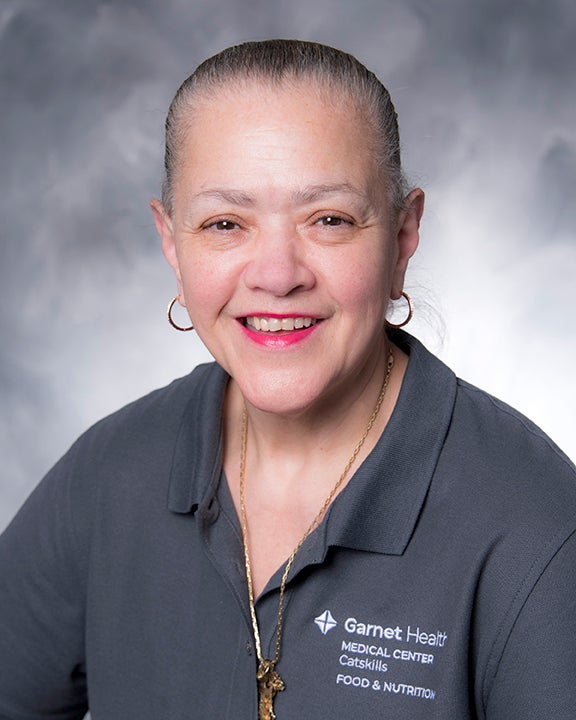 Aracelis “Sherry” Diaz, Nutrition and Food Services, Garnet Health Medical Center – Catskills
Aracelis “Sherry” Diaz, Nutrition and Food Services, Garnet Health Medical Center – Catskills
Sherry earned the August 2023 Employee of the Month Award because of her genuine kindness, which was exemplified in the caring way she helped a patient’s family member. An elderly gentleman was having breakfast while he waited for his wife’s tests to be completed. His hands were shaky, which prevented him from fixing his breakfast. Sherry took it upon herself to help the gentleman “as if he were her own dad.” Her nomination read, “It was wonderful and emotional to witness the care she provided to him.”
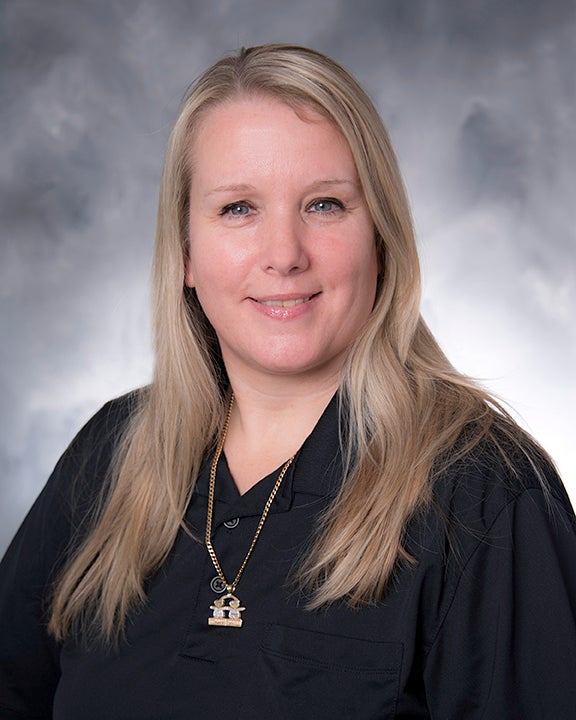 Tina Tyner, Nutrition and Food Services, Garnet Health Medical Center
Tina Tyner, Nutrition and Food Services, Garnet Health Medical Center
Tina was selected as the December 2023 Employee of the Month Award because of her empathy, selflessness and desire to help patients in need. Tina was serving meals to patients on the Mother Baby Unit. In one room, a toddler was there with the mom and newborn. The child said to Tina, “Mommy just had a baby, but we don’t have a crib for the baby when we get home.” Tina could not let this go. She started making calls to her co-workers and friends to see if anyone had a crib. She then searched Facebook Marketplace and found someone gifting a bassinet. Tina was able to secure the bassinet, which she presented to the patient just before discharge.
Each example is just one of many for these two honorees. Their kindness, compassion and hospitality to all they come in contact with provide an environment that patients and their families appreciate.
Anyone can nominate a Garnet Health employee, volunteer, provider or department for an award by visiting garnethealth.org/employees. To join our team, visit careers.garnethealth.org
About Garnet Health
Garnet Health is a New York State not-for-profit corporation headquartered in Middletown, New York, approximately 60 miles northwest of New York City. It is the corporate parent of Garnet Health Medical Center, Garnet Health Medical Center – Catskills, Garnet Health Doctors, Garnet Health Urgent Care, Garnet Health Foundation and Garnet Health Foundation – Catskills. Garnet Health is dedicated to developing specialty services, medical programs and needed healthcare services that allow residents to remain close to home to receive quality care.
Providing healthcare to approximately 500,000 residents in Orange, Sullivan and Ulster counties, Garnet Health was designed to improve the quality, stability and efficiency of healthcare services in the mid-Hudson and Catskills region. Garnet Health provides the services of more than 4,000 employed professionals and over 850 medical staff members. An academic affiliate of the Touro College of Osteopathic Medicine, Garnet Health retains compassionate professionals who continually strive toward the hospital’s mission to improve the health of our community by providing exceptional healthcare. To learn more about Garnet Health, visit garnethealth.org.
Body
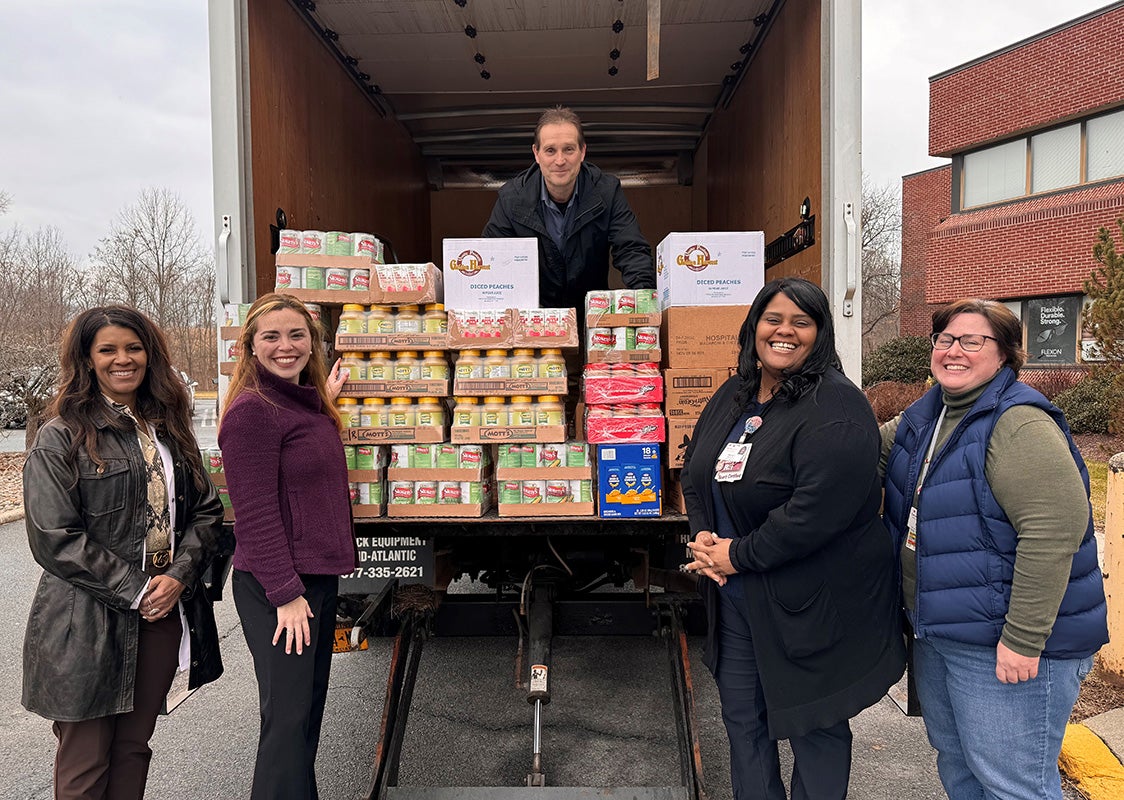 MIDDLETOWN, NY (Feb. 14, 2024) — Garnet Health proudly announces they have partnered with the Regional Food Bank of Northeastern New York. This partnership will allow Garnet Health’s already established Food Farmacy program to expand and reach even more patients affected by food insecurity.
MIDDLETOWN, NY (Feb. 14, 2024) — Garnet Health proudly announces they have partnered with the Regional Food Bank of Northeastern New York. This partnership will allow Garnet Health’s already established Food Farmacy program to expand and reach even more patients affected by food insecurity.
In Orange County, 9.8% of the population lives with food insecurity; in Sullivan County, it’s even higher, at 11.5%. In early 2023, Garnet Health established the Food Farmacy program as a way to help patients who screened as food insecure receive food upon discharge from any of the three Garnet Health hospitals.
Qualifying patients receive three days’ worth of food that is customized to their dietary needs. For example, a discharged patient with diabetes might receive a different food package than a cardiac patient. Patients who qualify will receive the appropriate canned and dry foods, as well as personal hygiene items and educational and resource information.
“We are so grateful for the support that our Garnet Health family has provided to get us to this point. We are pleased to partner with the Regional Food Bank of Northeastern New York to continue to provide an exceptional patient care experience by providing diet-friendly packages to our patients in need,” said Jonathan Schiller, president and CEO, Garnet Health.
“Our mission at the Regional Food Bank of Northeastern New York is not just to feed our neighbors in need, but to provide them with healthy and nutritious food,” said Tom Nardacci, CEO of the Regional Food Bank of Northeastern New York. “Partnerships like this with Garnet Health are instrumental in helping food-insecure neighbors with chronic diseases experience improved health and peace of mind.”
The Food Farmacy program’s success so far has come from a collaboration within Garnet Health, including donations from Community Health, the Nursing Community Committee, Volunteer Services, Food Services, Patient Access and Garnet Health staff. Partnering with the Regional Food Bank of Northeastern New York means Garnet Health can reach even more patients, sending them home with the nourishment needed to help them heal.
“Discharging patients with food is like sending them home with their medicine or spare dressings for their wounds,” said Moira Mencher, director of strategic planning and community relations, Garnet Health. “Food is a very important part of a person’s healing. Providing a patient with a couple of days of food and other resources reduces the stress of looking for their next meal or a ride to find one.”
To learn more about Garnet Health visit garnethealth.org
###
About Garnet Health
Garnet Health is a New York State, not-for-profit corporation headquartered in Middletown, New York, approximately 60 miles northwest of New York City. It is the corporate parent of Garnet Health Medical Center, Garnet Health Medical Center – Catskills, Garnet Health Doctors, Garnet Health Urgent Care, Garnet Health Foundation and Garnet Health Foundation – Catskills. Garnet Health is dedicated to developing specialty services, medical programs and needed healthcare services that allow residents to remain close to home to receive quality care.
Providing healthcare to approximately 450,000 residents in Orange, Sullivan and Ulster counties, Garnet Health was designed to improve the quality, stability and efficiency of healthcare services in the mid-Hudson and Catskill region. Garnet Health provides services by more than 4,000 employed professionals and over 850 medical staff members. An academic affiliate of the Touro College of Osteopathic Medicine, Garnet Health retains compassionate professionals who continually strive toward the hospital’s mission to improve the health of our community by providing exceptional healthcare. To learn more about Garnet Health, visit garnethealth.org
About the Regional Food Bank of Northeastern New York
The Regional Food Bank of Northeastern New York is a 501(c)(3) not-for-profit organization that collects donated food from the food industry and distributes it to nearly 900 charitable agencies, feeding the hungry in 23 counties of northeastern New York. The food provided by the Regional Food Bank helps to feed over 350,000 people each month. In 2022, the organization distributed 47 million pounds of food to the hungry. The Regional Food Bank is a member of Feeding America, the national network of food banks. The organization is supported by foundations, private contributions and fundraising events. For information on services offered by the Regional Food Bank, call (518) 786-3691 or visit regionalfoodbank.net.
Body
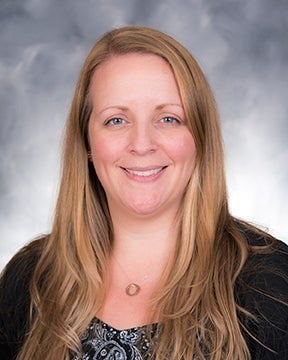 It was once simply called flu season, the time of year from fall through winter when the flu is most prevalent. But last year, as the world climbed out of the COVID-19 pandemic, the resurgence of flu and RSV cases seemingly slammed into the rise in COVID cases. This year, we are again seeing all three respiratory viruses on the rise in our communities.
It was once simply called flu season, the time of year from fall through winter when the flu is most prevalent. But last year, as the world climbed out of the COVID-19 pandemic, the resurgence of flu and RSV cases seemingly slammed into the rise in COVID cases. This year, we are again seeing all three respiratory viruses on the rise in our communities.
While it is convenient to group the flu, COVID-19 and RSV together due to their respiratory nature—and the fact that all three are most common during the winter months—it’s important to recognize that each illness is distinct and requires separate tests, vaccines and treatments. The more we understand these differences, the better we can safeguard the most vulnerable among us.
The Three Viruses Vying for Our Attention
Influenza (Flu)
The flu is a contagious respiratory illness caused by influenza viruses. It can cause a range of symptoms, from mild to severe, and in some cases, it can lead to hospitalization and death. According to the Centers for Disease Control and Prevention (CDC), flu signs and symptoms usually come on suddenly. People who are sick with the flu often feel some or all of these symptoms:
- Fever / feeling feverish or chills (not everyone gets a fever)
- Cough
- Sore throat
- Runny or stuffy nose
- Muscle or body aches
- Headaches
- Fatigue (tiredness)
- Vomiting and diarrhea (more common in children than adults)
The flu typically circulates during the fall and winter months, with the severity and impact varying from year to year. Those at risk of severe flu complications include the very young, the elderly, pregnant women and individuals with underlying health conditions. Vaccines are developed annually to provide protection against the most prevalent flu strains. The best way to protect yourself is to get an annual flu vaccine, which is safe and recommended for all individuals 6 months of age and older.
If you are diagnosed with the flu, influenza antiviral drugs may be a treatment option; however, they work best when started early, such as one to two days after your flu symptoms begin. Resting and staying hydrated are the best ways to manage the flu, as well as using over-the-counter medicines for fever reduction and pain relief.
COVID-19
Caused by the novel coronavirus SARS-CoV-2, COVID-19 has been the most prominent global health concern since 2019. It can lead to severe respiratory distress, hospitalization and death.
Symptoms can appear two to 14 days after exposure and can range in variety and severity. COVID-19 symptoms include:
- Fever or chills
- Cough
- Shortness of breath or difficulty breathing
- Fatigue
- Muscle or body aches
- Headache
- New loss of taste or smell
- Sore throat
- Congestion or runny nose
- Nausea or vomiting
- Diarrhea
If you experience any of these symptoms, it’s recommended you get tested for COVID-19. Risk of severe illness increases for those who are unvaccinated; adults ages 50 and older; and those who have underlying health issues, such as chronic lung disease or heart disease, or are immunocompromised. The updated COVID-19 vaccine is available. It’s safe and recommended for all individuals 6 months of age and older.
The FDA has authorized or approved several antiviral medications to treat mild-to-moderate COVID-19 in people who are more likely to get very sick. Most people with COVID-19 can recover at home with rest and over-the-counter medicines as needed.
Respiratory Syncytial Virus (RSV)
RSV is a common respiratory virus that primarily affects young children, the elderly and individuals with weakened immune systems. It can lead to mild cold-like symptoms but may cause severe lower-respiratory-tract infections in these vulnerable groups. People infected with RSV usually show symptoms within four to six days after getting infected.
Symptoms of RSV are often similar to the common cold and include:
- Runny nose
- Decrease in appetite
- Coughing
- Sneezing
- Fever
- Wheezing
Adults 60 and older can now receive an RSV vaccine. For infants, there are two options: Pregnant women can get the vaccine between 32 and 36 weeks, if that falls during RSV season (September through January), or their baby can receive RSV antibody immunization if the baby is younger than 8 months of age and was born during or entering their first RSV season.
Treatment for RSV can include over-the-counter fever reducers and pain relievers to manage symptoms.
It is essential to recognize that the flu, COVID-19 and RSV are distinct viruses with unique characteristics and risk factors. You can visit Garnet Health Urgent Care locations in Goshen, Middletown and Monticello to get tested for all three viruses, with rapid results. Stay on top of eligible vaccines by contacting your health care provider. Additionally, wearing a mask, staying hydrated, practicing good hand hygiene and getting enough sleep are important in helping to prevent the spread of respiratory viruses—to ensure we all have a safe and healthy winter season.
Garnet Health Doctors offers adult immunizations to their patients at locations in Callicoon, Goshen, Livingston Manor, Middletown, Monroe and Monticello. Garnet Health Urgent Care offers rapid testing for flu, COVID-19 and RSV at their Goshen, Middletown and Monticello locations.
Tags:
Body
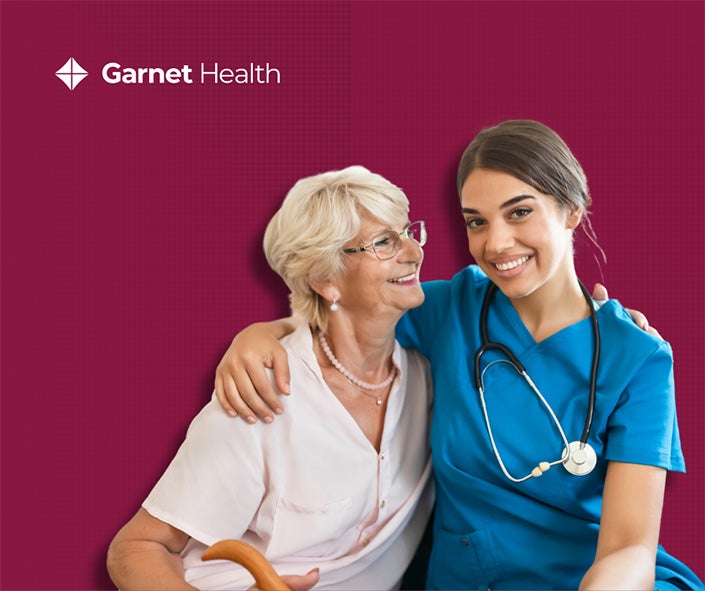 Coughing, sneezing, fever, vomiting, wheezing, stomach pains, headache ... There’s no doubt viruses abound during the winter months. And so do slips and falls from icy conditions. When you or a loved one is injured or sick, it’s natural to think your local emergency department (ED) is the first place you should go. But often, a trip to an urgent care center will meet your needs and give you the same quality of care! Choosing urgent care over an ED, when appropriate, can help keep ED volumes down, which will shorten wait times and ensure everyone gets the care they need quickly and safely. So how do you decide?
Coughing, sneezing, fever, vomiting, wheezing, stomach pains, headache ... There’s no doubt viruses abound during the winter months. And so do slips and falls from icy conditions. When you or a loved one is injured or sick, it’s natural to think your local emergency department (ED) is the first place you should go. But often, a trip to an urgent care center will meet your needs and give you the same quality of care! Choosing urgent care over an ED, when appropriate, can help keep ED volumes down, which will shorten wait times and ensure everyone gets the care they need quickly and safely. So how do you decide?
In some instances, you will know right away if you or a family member needs immediate medical attention. But other times, it may not be so clear. You can always call your primary care provider (or your child’s pediatrician) first. They can assess what is going on to determine where you should go, or if the ailment can possibly be treated at home.
Call 9-1-1
Let’s get the obvious out of the way first. Sometimes an injury or illness is so severe, immediate action is needed. Don’t try to manage the situation yourself. Instead, call 9-1-1 for immediate care and safe transport to the hospital. When to call 9-1-1:
- Breathing stops or a person is turning blue
- Broken bone sticking out through the skin
- Choking
- Ingestion of an unknown amount of medicine
- Loss of consciousness after a fall
- Seizure
- Serious allergic reaction
- Uncontrollable bleeding from a large cut/injury
- Any instance where you think someone’s condition is life-threatening
Emergency Department
An ED is open 24/7. Trips should be reserved for life-threatening or very serious illnesses and injuries. When people use the ED for routine exams, conditions or illnesses that are not serious—such as headache, fever, coughs, minor cuts, sprains, etc.—it creates longer wait times. Additionally, patients with more serious conditions and symptoms will be seen first, so you could be waiting for some time. Go to the ED for:
- Acute abdominal pain
- Children under 3 months of age who need immediate care
- Extreme pain, especially if the cause is unknown
- Eye injuries
- Falls with injury or while taking blood thinners
- High fevers
- Intestinal bleeding
- Loss of consciousness or vision
- Persistent chest pain (especially radiating to arm or jaw, with sweating, vomiting or shortness of breath)
- Repeated vomiting
- Seizures without a previous diagnosis of epilepsy
- Severe burns
- Severe heart palpitations
- Sudden severe head pain or injury
- Sudden testicular pain or swelling
- Suspected poisoning or drug overdose
- Traumatic injury
- Vaginal bleeding with pregnancy
- Weakness or paralysis
- Other conditions that appear to be serious
Urgent Care
Urgent care hours usually extend beyond the hours of a doctor’s office, allowing you to seek care earlier in the morning, into the evenings and on weekends without an appointment. At an urgent care center, you can get treatment for an injury or illness that shouldn’t wait but isn’t life-threatening. Things like stitches, sprains, coughing, fever, minor injuries and X-rays can all be treated at an urgent care location. Wait times can vary season to season. For example, urgent care wait times increase during flu season. Visit an urgent care center for:
- Allergic reactions
- Animal and bug bites
- Broken bones
- Cuts that may need stitches
- Coughs, congestion and sinus problems
- Earaches or infections
- Mild fevers
- Minor burns
- Neck and back pain
- Painful urination
- Pink eye or other minor eye problems
- Rashes
- Severe flu or cold symptoms
- Sprains and strains
- Throat pain
- Vomiting
Understanding whether to visit the emergency department or an urgent care center now can help when things happen later, and you need to decide quickly what to do.
Garnet Health Emergency Department Locations
Garnet Health Medical Center
707 East Main Street, Middletown, NY 10940
Level II Trauma | Pediatric Emergency Department | Designated Stroke Center
Garnet Health Medical Center – Catskills, Harris Campus
68 Harris Bushville Road, Harris, NY 12742
Designated Stroke Center
Garnet Health Medical Center – Catskills, Callicoon Campus
8881 Route 97, Callicoon, NY 12723
Garnet Health Urgent Care Locations
Garnet Health Urgent Care - Middletown
Outpatient Building
707 East Main Street
Middletown, NY 10940
845-333-7271
Garnet Health Urgent Care - Goshen
102 Clowes Ave
Goshen, New York 10924
Phone: 845-333-7200
Garnet Health Urgent Care - Monticello
38 Concord Road
Monticello, New York 12701
Phone: 845-333-6500
Tags:
Body
 Heart Healthy Recipes & Cooking Tips
Heart Healthy Recipes & Cooking Tips
Embarking on a journey towards improved health through bariatric surgery is a significant step, and it’s essential to prioritize cardiovascular health post-surgery. In this support group blog post, we’ll explore practical tips and insights to nurture your heart health on this transformative path.
1. Regular Exercise Routine:
- Start with low-impact activities like walking and gradually progress.
- Consult your healthcare team for a personalized exercise plan.
- Incorporate both aerobic exercises and strength training to enhance cardiovascular fitness.
2. Heart Healthy Nutrition:
- Emphasize a balanced diet with lean proteins, fruits, vegetables, and whole grains.
- Monitor your intake of saturated fats, sugar, and sodium.
- Stay hydrated to support overall cardiovascular function.
3. Vitamin & Mineral Supplementation:
- Follow your healthcare provider’s recommendations for post-bariatric surgery supplements.
- Ensure sufficient intake of vitamins and minerals vital for heart health, such as vitamin D, B-complex vitamins, and magnesium.
4. Regular Medical Checkups:
- Schedule routine checkups with your healthcare team to monitor your cardiovascular health.
- Keep track of blood pressure, cholesterol levels, and any other relevant markers.
5. Behavioral Changes:
- Address emotional eating habits through support groups, counseling, or therapy.
- Practice mindful eating to enhance awareness of food choices and portion control.
6. Smoking Cessation:
- As you are already aware, you must stop smoking before your bariatric surgery. (There can be no nicotine detected during the test performed to determine whether smoking cessation has occurred.) This should be a priority, especially to reduce your cardiovascular risks.
- Seek support from healthcare professionals or support groups for smoking cessation.
7. Stress Management:
- Incorporate stress-reducing activities like mindfulness, meditation, or yoga.
- Prioritize adequate sleep, as it plays a crucial role in heart health.
8. Community Support:
- Engage with your bariatric surgery support group for mutual encouragement.
- Share experiences, challenges, and successes related to cardiovascular health within the community.
Navigating the post-bariatric surgery journey requires dedication and a holistic approach to health. By prioritizing cardiovascular well-being through a combination of lifestyle changes, medical guidance, and community support, you’re setting yourself on a path to a heart-healthy and fulfilling life.
Remember, each step forward is a triumph, and you’re not alone on this transformative journey to a healthier YOU!
Heart Healthy Recipes
Grilled Lemon Herb Chicken with Quinoa Salad
Ingredients:
- Skinless, boneless chicken breasts
- Fresh lemon juice
- Olive oil
- Fresh herbs (rosemary, thyme, or oregano)
- Salt & pepper
- Quinoa
- Cherry tomatoes
- Cucumber
- Red onion
- Feta cheese (optional)
Instructions:
- Marinate chicken in a mixture of lemon juice, olive oil, chopped herbs, salt, and pepper.
- Grill chicken until cooked through and juicy.
- Cook quinoa according to package instructions.
- Dice tomatoes, cucmber, and red onion; mix with cooked quinoa.
- Drizzle olive oil, add salt and pepper, and toss the salad.
- Serve grilled chicken on a bed of quinoa salad. Top with feta if desired.
Baked Salmon with Roasted Vegetables
Ingredients:
- Salmon fillets
- Olive oil
- Garlic powder
- Lemon zest
- Assorted vegetables (broccoli, bell peppers, zucchini)
- Fresh herbs (dill or parsley)
- Salt and pepper
Instructions:
- Preheat the oven. Place salmon fillets on baking sheet.
- Drizzle olive oil, sprinkle garlic powder, lemon zest, and herbs over the salmon.
- Chop vegetables and arrange around the salmon.
- Season vegetables with salt, pepper, and a touch of olive oil.
- Bake until salmon is cooked through, and vegetables are tender.
- Garnish with fresh herbs before serving.
Cooking Tips:
- Portion Control: Use small plates to help control portion sizes and prevent overeating.
- Lean Proteins: Opt for lean protein sources like poultry, fish, and tofu to support muscle health.
- Steam or Grill: Choose cooking methods like steaming or grilling to retain nutrients without added fats.
- Herbs and Spices: Enhance flavor without extra calories by using herbs, spices, and citrus instead of excessive salt or heavy sauces.
- Hydration: Stay hydrated, but be sure to drink in between not during meals.
- Meal Prep: Plan and prepare meals ahead to ensure nutritious choices are readily available.
Remember to consult with your bariatric dietitian educator or bariatric surgery healthcare team for personalized advice based on your specific dietary needs post-bariatric surgery.
Tags:
Body
 (Photo credit: Blaise Bojo)
(Photo credit: Blaise Bojo)
“I knew where I needed to be.”
Blaise Bojo is used to dealing with emergencies. As an EMT and Fire Chief in the small community of Hancock in Delaware County, he’d rushed stroke patients to the Emergency Department, and entered burning buildings to save people’s homes. Helping the people of his community had been instilled in him by his father.
Toward the end of 2023, he experienced his own emergency, one that could have claimed his life if it wasn’t for the swift actions of the doctors and staff at the Stroke Center at Garnet Health Medical Center – Catskills.
October 20th was just another day. Blaise had left his house to gather with the rest of his family for dinner at his aunt’s house next door.
While making coffee, he felt a really sharp pain just above his left temple.
“I didn’t think anything of it at first,” explained Blaise, “but I turned around to talk to my brother and cousin, and they said, ‘Your nose is bleeding!’ About 15 minutes later, I’d started to develop right-side paralysis and aphasia. I just couldn’t put words together. I recognized at that point I needed to get help.”
Blaise’s wife quickly called 911, and by the time the ambulance had arrived his condition had worsened.
“The last thing I said to the paramedic was, ‘Take me to Catskills!’ I knew where I needed to be.”
Garnet Health Medical Center – Catskills is about 35 minutes away from his house, and with a suspected stroke, time is of the essence. Typically, medication should be given within three hours of when symptoms begin (https://www.garnethealth.org/stroke).
“I remember arriving at the Stroke Center, and seeing Dr. Maxwell,” recalls Blaise.
Nicki Maxwell, DO, Associate Medical Director of the Department of Emergency Medicine at Garnet Health Medical Center - Catskills evaluated Blaise upon his arrival.
“When Blaise came into the ED he was presenting with many classic stroke symptoms, and was immediately sent for a CT Scan. After reading his results and based his symptoms it was decided that the best course of action would be to administer a fast-acting thrombolytic, sometimes known as a "clot-buster", to dissolve a clot that was causing his stroke,” Dr. Maxwell explains. “In less than one hour, his symptoms had started to improve."
“From being brought through the doors of the Emergency Department, to getting the scan, and receiving the medication was 21 minutes,” said Blaise.
“The medication is the gold-standard of care. My stroke happened on Friday night, by Saturday I could completely move my right side. I was discharged a couple of days later to come home and rest.”
Blaise didn’t need to rest for too long, thanks to the swift, comprehensive care he had received.
“Seven weeks after my stroke, I went into a burning building to save someone’s home.”
Blaise can now look back on the experience with gratitude to the doctors and nurses that saved him, but at the time, he wasn’t sure if he would survive.
“It was scary, I could have died. But as an EMT, I knew where I needed to be. If it wasn’t for Garnet Health Medical Center – Catskills, I probably wouldn’t be here to help other people in an emergency.”
And bringing this all full-circle, Blaise’s father, Rolland “Boomer” Bojo, was the Chief Nursing Officer at Garnet Health Medical Center – Catskills for 18 years, and was one of the key leaders responsible for starting the stroke program at the hospital. That program, in tandem with the Stroke Center at Garnet Health Medical Center, continues to provide swift diagnosis and treatment to help the people in our community, just as Blaise continues to do.
About Garnet Health Medical Center – Catskills
Garnet Health Medical Center - Catskills is dedicated to providing quality health care to residents of Sullivan County and neighboring communities. Garnet Health Medical Center - Catskills is accredited by DNV GL – Healthcare. It is a recipient of the American Heart Association/American Stroke Association’s Get With The Guidelines®- Stroke Gold Plus award, and received the College of Healthcare Information Management Executives (CHIME) Digital Health Most Wired recognition. Learn more about Garnet Health Medical Center – Catkills.
Inspired Giving Program
"When Thank You Isn't Enough" - The Inspired Giving Program provides an opportunity for our patients and their families to publicly celebrate inspired care. Caregivers will be recognized by the Foundation, and receive a beautiful pin to wear proudly. Through this program, patients and their families have the opportunity to recognize employees, physicians and volunteers who provide exceptional care and kindness. Learn more at garnethealth.org/inspired.
Tags:
Body
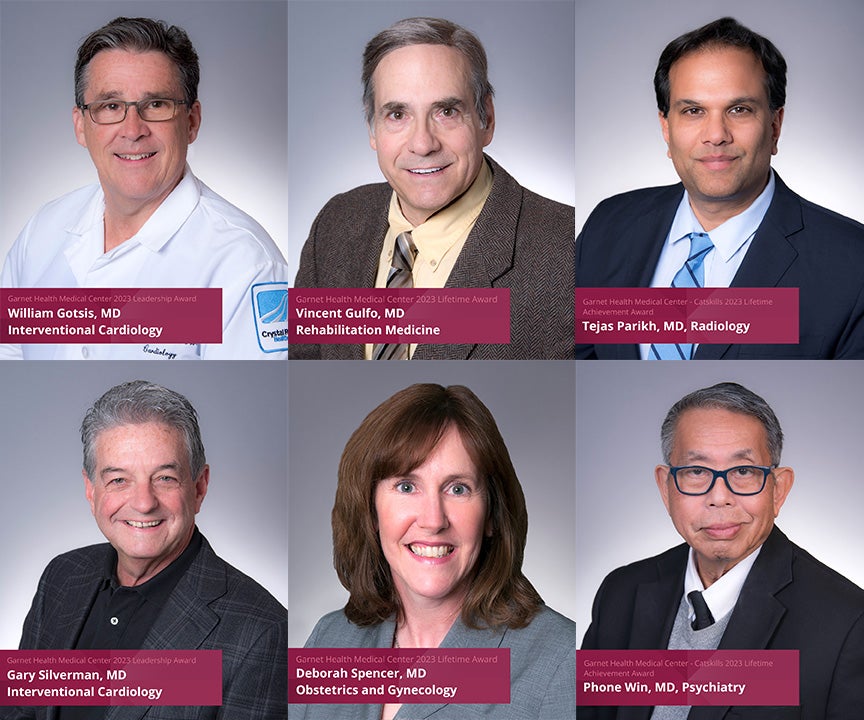 MIDDLETOWN, NY (Jan. 22, 2024) — Garnet Health recently announced the recipients of their 2023 Physician Awards. Physicians were selected by the Medical Executive Committees of Garnet Health Medical Center and Garnet Health Medical Center – Catskills and were recognized by Garnet Health Board of Directors Chair Phillip Massengill, MD. Honorees were selected based on their commitment to their patients and community; each standing out in their respective fields as honorable physicians who go above and beyond for patient care.
MIDDLETOWN, NY (Jan. 22, 2024) — Garnet Health recently announced the recipients of their 2023 Physician Awards. Physicians were selected by the Medical Executive Committees of Garnet Health Medical Center and Garnet Health Medical Center – Catskills and were recognized by Garnet Health Board of Directors Chair Phillip Massengill, MD. Honorees were selected based on their commitment to their patients and community; each standing out in their respective fields as honorable physicians who go above and beyond for patient care.
“On behalf of the Garnet Health Board of Directors, we congratulate Garnet Health’s 2023 Physician Award honorees,” said Dr. Massengill. “While we are proud of all our extremely talented physicians, each year we like to take a moment to honor those who exemplify the very best and bring out the best in their peers and clinical teams. We thank them for all they have done to provide exceptional healthcare to our patients.”
Below lists those who were honored.
Garnet Health Medical Center 2023 Lifetime Awards:
Vincent Gulfo, MD, Rehabilitation Medicine
Dr. Gulfo joined the medical staff in 1999 and has been a fixture of the rehabilitation unit. With over 33 years of service to our community, he is well respected by staff and patients. The care Dr. Gulfo provides goes beyond a patient’s rehabilitation needs. He is dedicated to providing all patients with the care they need and deserve.
Deborah Spencer, MD, Obstetrics and Gynecology
Dr. Spenser joined the medical staff in 1996 and has delivered more than 3,000 babies throughout her time as an expert physician. With a career spanning more than 33 years of providing quality OB/GYN care to women in our community, Dr. Spenser has gone above and beyond delivering joy to her patients with exceptional care, grace, and compassion.
Garnet Health Medical Center 2023 Leadership Awards:
William Gotsis, MD, Interventional Cardiology
Having joined the medical staff in 1996, Dr. Gotsis has provided expert cardiac interventional care to more than 7,000 patients, many in their greatest hour of need, and has cared for nearly 500 patients since the start of interventions for acute myocardial infarction (MI). Over his nearly three decades of service, he has worked diligently in helping to establish and increase performance outcomes of Garnet Health Medical Center’s cardiac catheterization lab to be one of the best in the region. A physician who never says no and is always available for patients and staff, Dr. Gotsis’s leadership skills have further assisted and supported new providers throughout the years.
Gary Silverman, MD, Interventional Cardiology
Dr. Silverman joined the medical staff in 1999 and has since performed more than 5,000 cardiac catheterizations and has cared for nearly 450 patients since the start of interventions for acute MIs. Dr. Silverman is the epitome of professionalism and is often the first to provide guidance, support, assistance and education to all staff. Even as a leader he is a consummate team player.
Together, the team of Dr. Gotsis and Dr. Silverman has lead Garnet Health Medical Center to a new level of cardiac care in the Hudson Valley.
Garnet Health Medical Center – Catskills 2023 Lifetime Achievement Award
Phone Win, MD, Psychiatry
Having joined the medical staff in 2001, Dr. Win has exhibited exceptional dedication to patient care. He is actively involved in medical staff developments and resident growth. His dedication and talent have played a key role in psychiatry care to our patients.
Garnet Health Medical Center – Catskills 2023 Leadership Award
Tejas Parikh, MD, Radiology
Dr. Parikh joined the medical staff in 2006 and has been an active leader in the development of the radiology department. With exemplary professionalism, Dr. Parikh’s leadership has been integral to orienting new providers – offering guidance, assistance and education.
To learn more about Garnet Health visit garnethealth.org
###
About Garnet Health
Garnet Health is a New York State, not-for-profit corporation headquartered in Middletown, New York, approximately 60 miles northwest of New York City. It is the corporate parent of Garnet Health Medical Center, Garnet Health Medical Center – Catskills, Garnet Health Doctors, Garnet Health Urgent Care, Garnet Health Foundation and Garnet Health Foundation – Catskills. Garnet Health is dedicated to developing specialty services, medical programs and needed healthcare services that allow residents to remain close to home to receive quality care.
Providing healthcare to approximately 450,000 residents in Orange, Sullivan and Ulster counties, Garnet Health was designed to improve the quality, stability and efficiency of healthcare services in the mid-Hudson and Catskill region. Garnet Health provides services by more than 4,000 employed professionals and over 850 medical staff members. An academic affiliate of the Touro College of Osteopathic Medicine, Garnet Health retains compassionate professionals who continually strive toward the hospital’s mission to improve the health of our community by providing exceptional healthcare. To learn more about Garnet Health, visit garnethealth.org
Body
 Just over one year ago, Garnet Health’s award-winning Peter Frommer, M.D. Heart Center announced the opening of their new open-heart surgery program, in partnership with NewYork-Presbyterian/Columbia University Irving Medical Center. It’s the first program of its kind in Orange County, and the service has exceeded expectations. Garnet Health provides lifesaving complex cardiothoracic procedures locally, so Hudson Valley residents can receive expert heart-surgery care without the stress of traveling to New York City and being away from their loved ones.
Just over one year ago, Garnet Health’s award-winning Peter Frommer, M.D. Heart Center announced the opening of their new open-heart surgery program, in partnership with NewYork-Presbyterian/Columbia University Irving Medical Center. It’s the first program of its kind in Orange County, and the service has exceeded expectations. Garnet Health provides lifesaving complex cardiothoracic procedures locally, so Hudson Valley residents can receive expert heart-surgery care without the stress of traveling to New York City and being away from their loved ones.
As we look to a new year and approach American Heart Month in February, let’s take a moment to remember the American Heart Association’s Essential 8 ways we can take care of our heart and step into a healthier lifestyle in 2024:
- Eat better. The American Heart Association (AHA) recommends a healthy diet that includes whole foods, fruits, vegetables, lean protein, nuts and seeds, as well as cooking with nontropical oils like olive and canola.
- Get active. Adults should get 150 minutes a week of moderate aerobic activity, like walking, taking a bike ride, doing water aerobics or gardening, or 75 minutes a week of vigorous activity, like running, spinning or swimming laps. Or do a combination of both!
- Quit smoking. The AHA offers many resources to help, starting with their Quitline: 1-800-QUIT-NOW.
- Get healthy sleep. Most adults need seven to nine hours of sleep each night. According to the AHA, adequate sleep promotes healing, improves brain function and reduces the risk for chronic diseases. Garnet Health offers sleep studies to help diagnose and treat a wide variety of sleep disorders.
- Manage your weight. Understanding your BMI, journaling your food intake and learning portion control are just a few tips. If you require more specialized help, the bariatric specialists at Garnet Health can discuss weight loss options with you.
- Manage your blood sugar. Knowing and understanding your blood sugar levels is important to maintaining good health and preventing the risk of diabetes, which can lead to heart disease or stroke. Garnet Health’s free diabetes prevention program , for qualified participants, can help evaluate your risk. They also offer a diabetes treatment center for those who require diabetes care.
- Manage your blood pressure. Keeping your blood pressure at a normal range can keep you healthier longer!
- Control your cholesterol. High levels of “bad” cholesterol can lead to an increased risk of heart disease.
Garnet Health offers the Know Your Numbers Program, a free mobile screening service that determines your risk of heart disease or stroke. If you’re interested in learning more, call 845-333-2632.
Unfortunately, heart disease is still a leading cause of death in both Orange and Sullivan counties. Knowing this, we should all understand how to identify a cardiac arrest and a heart attack, which—despite the terms being used interchangeably—are not the same thing.
Cardiac Arrest
According to the Centers for Disease Control and Prevention (CDC), a cardiac arrest occurs when the heart suddenly and unexpectedly stops beating. This malfunction causes the blood to stop flowing to the rest of the body. Signs of cardiac arrest include:
- Collapsing suddenly and passing out
- Not breathing; gasping for air
- Not responding to shouting or shaking
- Not having a pulse
Cardiac arrest is a leading cause of death, and fast action can save lives. Call 9-1-1 immediately and start CPR right away.
Heart Attack
A heart attack occurs when blood flow to the heart is blocked. The more time that passes without treatment, the more damage to the heart. The signs and symptoms of a heart attack can differ for men and women, but the CDC describes these as major symptoms:
- Chest pain or discomfort. Most heart attacks involve discomfort in the center or left side of the chest that lasts for more than a few minutes or that goes away and comes back. The discomfort can feel like uncomfortable pressure, squeezing, fullness, or pain.
- Feeling weak or lightheaded, or fainting. You may also break out into a cold sweat.
- Pain or discomfort in the jaw, neck or back.
- Pain or discomfort in one or both arms or shoulders.
- Shortness of breath.
Tiredness, nausea, and vomiting can also occur, although these symptoms are more common in women.
In some cases, a heart attack can lead to a cardiac arrest. If you experience any of these symptoms yourself or notice them in a loved one, call 9-1-1 immediately.
Despite our best efforts, some things like our genetics, age and ethnicity increase the risk of heart disease. In an effort to further improve and expand our care for patients with advanced cardiovascular disease, Garnet Health recently cut the ribbon on a new hybrid surgical suite located at Garnet Health Medical Center in Middletown. They now have two state-of-the-art cardiac OR suites. Combined with the expert surgeons from Columbia University Irving Medical Center, Garnet Health now offers the most advanced technology and expertise to perform even more lifesaving open-heart surgeries as well as critical non-invasive cardiac procedures.
Should you need to see a specialist about a heart condition, Garnet Health offers Sullivan County residents the very best in heart care. Throughout our health system, we have comprehensive heart care services—from diagnosis to treatment and rehabilitation—and we’re proud to be a cardiovascular health leader in the region.
For more information on Garnet Health’s cardiac services, visit garnethealth.org/heartcare or call (845) 333-8909 to make an appointment with a cardiologist. To schedule a visit with a primary care provider, call (845) 333-6500.

